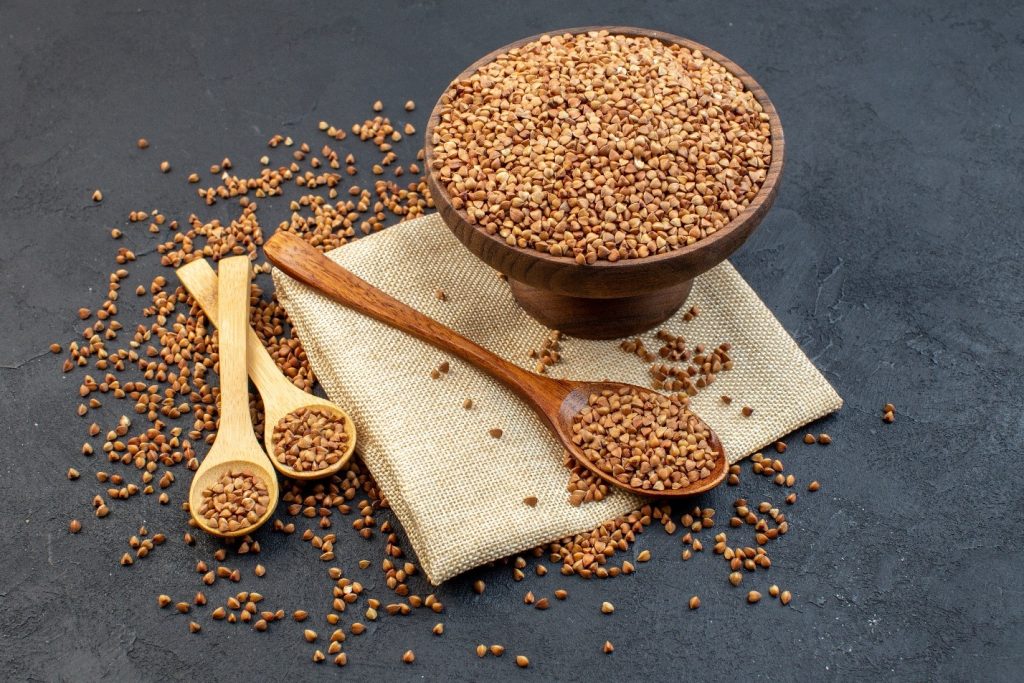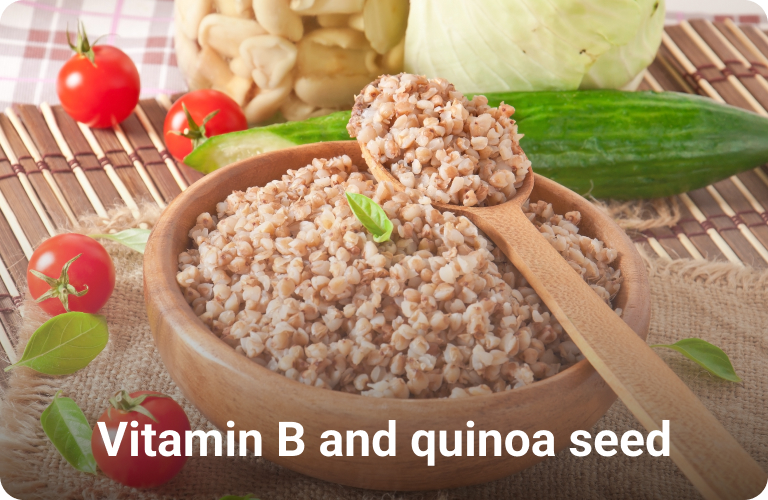Quinoa is one of the healthy and nutritious food products that has recently gained immense popularity despite its long history. This small seed itself is a rich source of vitamins and nutrients. Vitamin B is one of the important vitamins found in quinoa. This vitamin is crucial for overall body health, cell function, the nervous system, and skin health. Additionally, vitamin B plays a significant role in energy production for the body. In this article by QuinoFit, we explore the connection between quinoa and vitamin B. Stay connected with us.
Benefits of Vitamin B and Its Impact on the Human Body
Our bodies require vitamin B for various reasons and functions. B-group vitamins are water-soluble vitamins that play important roles in many bodily functions, such as:
1. Energy production: B-group vitamins convert food into energy that our cells can use. They are particularly important for boosting the metabolism of carbohydrates, proteins, and fats.
2. Nervous system function: Certain B-group vitamins like thiamine (B1), riboflavin (B2), and pyridoxine (B6) are essential for proper nervous system function. These vitamins help maintain nerve health and support the production of neurotransmitters, which are chemicals that transmit signals between nerve cells.
3. Red blood cell production: Vitamin B12 and folate (B9) are important for the production of red blood cells, which carry oxygen throughout the body. Deficiency in these vitamins can lead to anemia, a condition where there are not enough red blood cells to supply oxygen to the body.
4. DNA synthesis and repair: B-group vitamins are crucial for DNA synthesis and repair. DNA is the genetic material that contains instructions for the growth and function of all living organisms.
5. Immune system function: Some B-group vitamins like niacin (B3) and folate (B9) are important for proper immune system function. These types of vitamins assist in the production of white blood cells, which are essential for fighting infections.
In general, B-group vitamins are essential for maintaining health and preventing various health issues. Deficiency in these vitamins can lead to a wide range of symptoms, including fatigue, weakness, irritability, poor concentration, and more.
Sources of Vitamin B
• There are many foods that are rich in vitamin B, including:
• Whole grains such as brown rice, oats, and wheat
• Legumes such as lentils, beans, and chickpeas
• Nuts and seeds such as almonds, peanuts, sunflower seeds, and quinoa
• Dairy products such as milk, cheese, and yogurt
• Eggs and lean meats such as chicken, turkey, and fish
• Leafy green vegetables such as spinach, kale, and broccoli
• Fruits such as bananas, avocados, and citrus fruits
• Fortified breakfast cereals and nutritional yeast.
It is important to note that different types of vitamin B can be found in various foods. For example, vitamin B12 is mainly found in animal products, while vitamin B6 can be found in both animal and plant-based foods. Therefore, it is important to have a diverse and balanced diet to ensure you are receiving all the different types of vitamin B that your body needs.

The Amazing Benefits of Vitamin B and Quinoa
• Vitamin B is essential for proper functioning of the nervous system, red blood cell production, and energy metabolism. They also play a role in DNA production and maintaining healthy skin and hair.
• As mentioned in the quinoa and protein article, quinoa is a complete protein source that contains all nine essential amino acids, making it an excellent plant-based protein option for vegetarians and vegans. It is also rich in fiber, which can aid in digestion and weight management. For more information, you can refer to the quinoa and fiber article.
• Quinoa is also rich in minerals such as magnesium, phosphorus, and potassium, which are important for bone health, muscle function, and heart health.
• Both vitamin B and quinoa have anti-inflammatory properties that can help reduce the risk of chronic diseases such as heart disease, cancer, and diabetes.
Read more: Quinoa and Diabetes Prevention
• Quinoa is also gluten-free and is a great option for individuals with celiac disease or gluten intolerance.
Quinoa is a rich source of various B vitamins. The combination of B vitamins and quinoa in your diet can provide a wide range of health benefits, including improved brain function, better digestion, and reduced risk of chronic diseases.
Quinoa is a good source of several B vitamins, including thiamine (B1), riboflavin (B2), niacin (B3), pyridoxine (B6), and folate (B9). The exact amount of each vitamin can vary depending on the brand and preparation of quinoa.
cinofit is a brand that produces high-quality quinoa with very high nutritional value, containing significant amounts of vitamins, protein, fiber, and more. By purchasing and consuming quinoa daily, you can meet all the necessary mineral requirements for your body.
In general, one cup (185 grams) of cooked quinoa contains approximately:
Thiamine (B1): 0.2 milligrams (or 14% of the daily value)
Riboflavin (B2): 0.2 milligrams (or 15% of the daily value)
Niacin (B3): 0.8 milligrams (or 5% of the daily value)
Pyridoxine (B6): 0.2 milligrams (or 10% of the daily value)
Folate (B9): 78 micrograms (or 20% of the daily value)
These values may slightly vary depending on the quinoa brand used and the cooking method, but it can be clearly stated that quinoa grains are considered a very good source of B vitamins.
Frequently Asked Questions
Does quinoa contain vitamin B?
Yes, quinoa is rich in various vitamins, including vitamin B.
What are the benefits of vitamin B?
Vitamin B promotes energy production, improves the functioning of the nervous and immune systems, aids in DNA synthesis, and supports red blood cell production.
Which foods contain vitamin B?
One of the best sources of vitamin B is quinoa.
Is quinoa suitable for vegetarians and vegans?
Yes, quinoa is a complete protein source that contains all nine essential amino acids, making it an excellent plant-based protein option for vegetarians and vegans.
Can individuals with diabetes consume quinoa?
Yes, quinoa helps control blood sugar levels.
Is quinoa beneficial for brain function?
Yes, quinoa is rich in vitamin B and is highly beneficial for brain function.
What is the amount of vitamin B in quinoa?
The exact amount of each vitamin can vary depending on the brand and preparation of quinoa.
Can I consume quinoa daily?
Yes, by consuming quinoa daily, you can meet all the necessary mineral requirements for your body.
Quinofit offers quinoa in suitable packaging and at a reasonable price. If you are interested in purchasing white quinoa, you can contact us to obtain information about the product’s features and the purchasing process.




